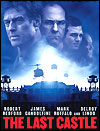| |

A
GENERAL LEADS A PRIVATE WAR IN THE LAST CASTLE
 A
three-star general pleads guilty in a court-martial and is
sentenced to ten years at Leavenworth in The Last Castle,
directed by Rod Lurie. The offense is to disobey orders and
ignore intelligence by authorizing a foray in Burundi that
results in the death of eight American soldiers. Colonel Winter
(played by James Gandolfini), the prison commandant, greets
General Irwin (played by Robert Redford) personally in his
office on his first day of confinement, when Irwin says that
he just wants to serve his time and get out. Although Winter
initially asks Irwin to autograph a special book, he demurs
when Irwin comments that the collection of memorabilia in
his office means that he has never seen battle. But battle
is indeed in store for Winter, who sadistically enjoys provoking
racial conflict among the prisoners and giving out punishments
way out of proportion to the offenses. In particular, Winter
picks on Corporal Aguilar (played by Clifton Collins, Jr.),
who is so impressed by the presence of General Irwin that
he disobeys regulations and salutes him, for which the punishment
is to maintain a salute for hours despite a heavy downpour
of rain. Irwin, meanwhile, assesses the social and physical
aspects of the prison the way a chessplayer analyzes a chessboard.
As the film’s tagline says, "No castle can have
two kings." One of his first moves is to end the racial
divisions by encouraging Caucasian prisoners to accept Aguilar’s
masonry expertise in building a wall, and Aguilar carves his
name in one of the blocks. However, Winter arranges to bulldoze
the wall in order to destroy morale. Aguilar then places himself
between the bulldozer and the wall, whereupon Winter orders
him shot with a rubber bullet so placed that he is killed.
Incensed by the mistreatment, Irwin then plans to take over
the prison, citing grounds in the Unified Code of Military
Justice. Meanwhile, Yates (played by Mark Ruffalo) appears
not to want to go along with the plan, which is to conclude
by raising the American flag upside down. Winter asks Yates
to reveal the battle plan, and Yates discloses that the flag
will be flown upside down. When the prison flag is missing
one day, Winter orders a shakedown of all the prison cells,
so the prisoners assemble together outside, just what Irwin
expected. Thereafter, Molotov cocktails blow up some of the
guard towers, a catapult hurls Aguilar’s block into the
picture window of Winter’s office, the prisoners take
over a water cannon, the prison’s helicopter is seized,
but surprisingly the walls are not breached despite all the
firepower. When Winter gives the order for all prisoners to
lie on the ground, they refuse. When Irwin gives the same
order, they obey. Irwin has indeed taken control of Leavenworth.
The climax of the film then deals with how Winter deals with
Irwin and whether the flag is flown upside down or rightside
up. As an action film, The Last Castle is one
of the best of the year. Careful reviewers will note, however,
that Irwin ended racial conflict rather easily by providing
leadership and a common goal, perhaps a lesson for other prisons
where rehabilitation is no longer the goal and racial division
is endemic. MH A
three-star general pleads guilty in a court-martial and is
sentenced to ten years at Leavenworth in The Last Castle,
directed by Rod Lurie. The offense is to disobey orders and
ignore intelligence by authorizing a foray in Burundi that
results in the death of eight American soldiers. Colonel Winter
(played by James Gandolfini), the prison commandant, greets
General Irwin (played by Robert Redford) personally in his
office on his first day of confinement, when Irwin says that
he just wants to serve his time and get out. Although Winter
initially asks Irwin to autograph a special book, he demurs
when Irwin comments that the collection of memorabilia in
his office means that he has never seen battle. But battle
is indeed in store for Winter, who sadistically enjoys provoking
racial conflict among the prisoners and giving out punishments
way out of proportion to the offenses. In particular, Winter
picks on Corporal Aguilar (played by Clifton Collins, Jr.),
who is so impressed by the presence of General Irwin that
he disobeys regulations and salutes him, for which the punishment
is to maintain a salute for hours despite a heavy downpour
of rain. Irwin, meanwhile, assesses the social and physical
aspects of the prison the way a chessplayer analyzes a chessboard.
As the film’s tagline says, "No castle can have
two kings." One of his first moves is to end the racial
divisions by encouraging Caucasian prisoners to accept Aguilar’s
masonry expertise in building a wall, and Aguilar carves his
name in one of the blocks. However, Winter arranges to bulldoze
the wall in order to destroy morale. Aguilar then places himself
between the bulldozer and the wall, whereupon Winter orders
him shot with a rubber bullet so placed that he is killed.
Incensed by the mistreatment, Irwin then plans to take over
the prison, citing grounds in the Unified Code of Military
Justice. Meanwhile, Yates (played by Mark Ruffalo) appears
not to want to go along with the plan, which is to conclude
by raising the American flag upside down. Winter asks Yates
to reveal the battle plan, and Yates discloses that the flag
will be flown upside down. When the prison flag is missing
one day, Winter orders a shakedown of all the prison cells,
so the prisoners assemble together outside, just what Irwin
expected. Thereafter, Molotov cocktails blow up some of the
guard towers, a catapult hurls Aguilar’s block into the
picture window of Winter’s office, the prisoners take
over a water cannon, the prison’s helicopter is seized,
but surprisingly the walls are not breached despite all the
firepower. When Winter gives the order for all prisoners to
lie on the ground, they refuse. When Irwin gives the same
order, they obey. Irwin has indeed taken control of Leavenworth.
The climax of the film then deals with how Winter deals with
Irwin and whether the flag is flown upside down or rightside
up. As an action film, The Last Castle is one
of the best of the year. Careful reviewers will note, however,
that Irwin ended racial conflict rather easily by providing
leadership and a common goal, perhaps a lesson for other prisons
where rehabilitation is no longer the goal and racial division
is endemic. MH
|
FROM
HELL TRIES TO LINK JACK THE RIPPER TO QUEEN VICTORIA
 In
1888 Jack the Ripper terrorized the East End of London. At
least five prostitutes plying their trade late at night in
Whitechapel had their throats slit, and in four cases their
bodies were mutilated. Thirteen other victims have been alleged.
Jack was never caught, though more than a dozen persons have
been suspected of the crimes. In From Hell,
codirectors Albert and Allen Hughes try to portray the madness
and solve the puzzle, based on a story by Alan Moore and Eddie
Campbell that constructs a tale of political intrigue. Inspector
Frederick George Abberline (played by Johnny Depp) is assigned
to the case by his superior, Police Sergeant Godley (played
by Robbie Coltrane), who summons Abberline to duty from an
opium stupor, a result of his grief over the death of his
wife three years earlier. What Inspector Abberline uncovers,
step by step, is an elaborate plot hatched in the royal palace
of reclusive Queen Victoria, who sought to cover up a scandal.
The scandal is that her eldest son, Prince Albert, married
a prostitute in the presence of several others and sired a
child who would be next in line to the throne upon Albert’s
death. Although Albert was rumored to be gay in the 1880s,
he evidently was also a frequent visitor to the Whitechapel
brothels, and he knew how to slaughter animals in ways similar
to the way victims were mutilated, so he is one of a number
of possible suspects. Abberline's principal confidant is Sir
William Gull (played by Ian Holm), the Royal Physician, who
was secretly working with and covering up for Albert, as was
the Police Commissioner (played by Ian Richardson), who takes
Abberline off the case when he gets too close to the truth.
In the course of his investigation Abberline goes to Whitechapel
to interview prostitutes, notably Mary Jane Kelly (played
by Heather Graham), whom he seeks to protect from the horrible
death in store for those who witnessed the wedding and knew
about the child. For his kindness, Mary once tries to plant
a kiss on Abberline, who first pushes her away and then pulls
her toward him to kiss her passionately. The plot further
vilifies the conspirators by identifying them as anti-Semites,
anti-foreigners, and bloodthirsty Freemason snobs. To silence
Gull, he is ultimately lobotomized, a common remedy at the
time to calm those who were mentally disturbed. Abberline,
unable to arrest the culprits, then returns to the opium den
at the end of the film. The preposterous story is made more
grisly by animations of various sorts, including the removal
of the victims’ internal organs, to provide something
frightening for the Halloween season. MH In
1888 Jack the Ripper terrorized the East End of London. At
least five prostitutes plying their trade late at night in
Whitechapel had their throats slit, and in four cases their
bodies were mutilated. Thirteen other victims have been alleged.
Jack was never caught, though more than a dozen persons have
been suspected of the crimes. In From Hell,
codirectors Albert and Allen Hughes try to portray the madness
and solve the puzzle, based on a story by Alan Moore and Eddie
Campbell that constructs a tale of political intrigue. Inspector
Frederick George Abberline (played by Johnny Depp) is assigned
to the case by his superior, Police Sergeant Godley (played
by Robbie Coltrane), who summons Abberline to duty from an
opium stupor, a result of his grief over the death of his
wife three years earlier. What Inspector Abberline uncovers,
step by step, is an elaborate plot hatched in the royal palace
of reclusive Queen Victoria, who sought to cover up a scandal.
The scandal is that her eldest son, Prince Albert, married
a prostitute in the presence of several others and sired a
child who would be next in line to the throne upon Albert’s
death. Although Albert was rumored to be gay in the 1880s,
he evidently was also a frequent visitor to the Whitechapel
brothels, and he knew how to slaughter animals in ways similar
to the way victims were mutilated, so he is one of a number
of possible suspects. Abberline's principal confidant is Sir
William Gull (played by Ian Holm), the Royal Physician, who
was secretly working with and covering up for Albert, as was
the Police Commissioner (played by Ian Richardson), who takes
Abberline off the case when he gets too close to the truth.
In the course of his investigation Abberline goes to Whitechapel
to interview prostitutes, notably Mary Jane Kelly (played
by Heather Graham), whom he seeks to protect from the horrible
death in store for those who witnessed the wedding and knew
about the child. For his kindness, Mary once tries to plant
a kiss on Abberline, who first pushes her away and then pulls
her toward him to kiss her passionately. The plot further
vilifies the conspirators by identifying them as anti-Semites,
anti-foreigners, and bloodthirsty Freemason snobs. To silence
Gull, he is ultimately lobotomized, a common remedy at the
time to calm those who were mentally disturbed. Abberline,
unable to arrest the culprits, then returns to the opium den
at the end of the film. The preposterous story is made more
grisly by animations of various sorts, including the removal
of the victims’ internal organs, to provide something
frightening for the Halloween season. MH
|
|